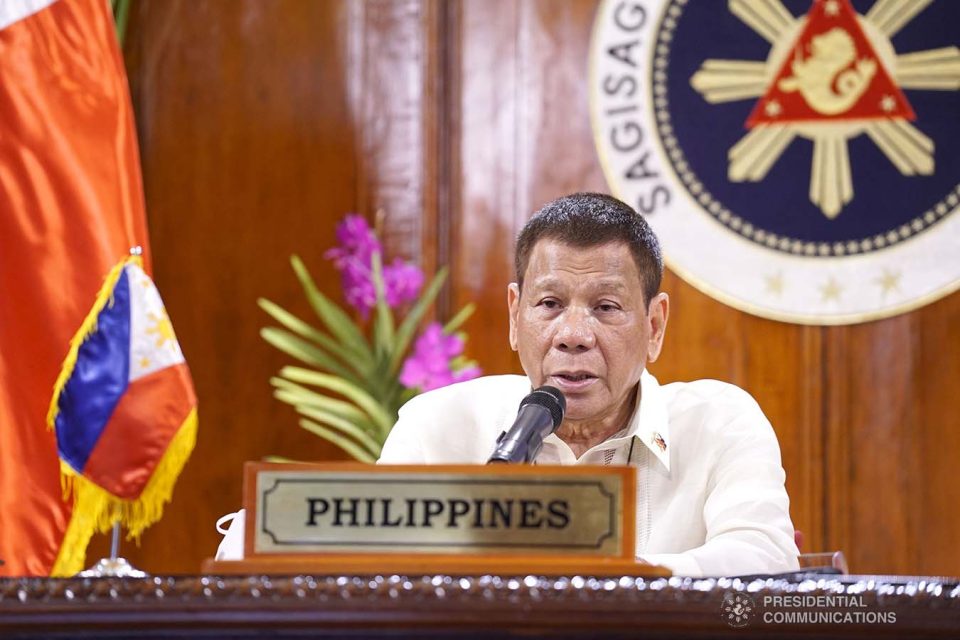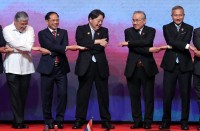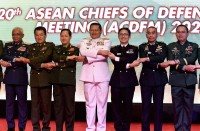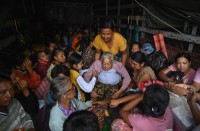
(Eagle News) — President Rodrigo Roa Duterte called on various economies to address the twin threats of COVID-19 and terrorism amid the virus pandemic by becoming more open economically with the proper observance of health protocols, and to engage in stronger cooperation among nations.
In his statement during the Aqaba Process Virtual Meeting on COVID-19 response hosted by Jordanian King Abdullah II, President Duterte called for global unity to address terrorism and COVID-19 not by shutting down economies but by helping each other rise above the various crises.
“Our urgent common response was to close down borders and impose limits to mobility and trade. The repercussions, as we are seeing now, are grim and far-reaching. We have economies in recession, institutions in crisis, and societies in state of uncertainty,” Duterte said.
“As insecurity rises, the fear of the “Other” and the unknown heightens. This brings out man’s darkest tendencies to look inward and go it alone. But the path to recovery requires more openness, deeper solidarity, and stronger cooperation among nations,” he said.
-Greatest challenge of our time-
The Philippine president described this pandemic as “the greatest challenge of our time – one that is truly global in reach and unprecedented in consequences.”
“No country – big or small, rich or poor – has been spared by the COVID-19 pandemic. For the first time, all of humanity fear the exact same invisible menace. Not even the Second World War had this most sweeping effect,” Duterte said.
But the Philippine leader noted that while the COVID-19 pandemic rages, this has not stopped terrorist groups in the country from sowing terror as he recalled the recent twin bombing incidents in Sulu which has killed 14 people and injured 75 others, mostly civilians.
“Excellencies, even as we are navigating ourselves out of this pandemic, the Philippines continues to confront security threats.
Indeed, COVID-19 has not quarantined terrorists,” he said.
“Local terrorist groups, such as the Abu Sayyaf, the Bangsamoro Islamic Freedom Fighters, and the New People’s Army of the Communist Party of the Philippines have been emboldened: They exploit the situation to serve their nefarious activities,” Duterte said.
But President Duterte emphasized that “religion has nothing to do with terrorism” and stated his government’s resolve to fight terrorism amid the pandemic.
-Economic cooperation vital to survive pandemic, says Duterte-
He said that “reviving the economy is vital.”
He said that “economic self-sufficiency may seem a logical response to the supply chain disruption we saw at the start of the pandemic” but that economic independence “is not the answer.”
“It is a mirage. It seems like a real solution, but it is in fact an impossible proposition,” Duterte said.
“The key to shared prosperity is the free movement of goods, capital, and services, complemented with appropriate social safety nets. This is why we in ASEAN are drawing up a comprehensive recovery plan anchored on strengthening economic cooperation and supply chain connectivity. We will build on existing platforms to ensure unimpeded trade in the region,” he explained.
-Duterte thanks Jordanian King for Aqaba meeting-
President Duterte also thanked the Jordanian king for hosting the Aqaba Process Virtual Meeting on COVID-19 Response.
“I thank His Majesty King Abdullah II for this timely Aqaba Process meeting. With this initiative, Jordan chooses partnership over self-defeating isolation. And so do all of us joining today,” Duterte said.
He also thanked the Jordanian leader for providing the Philippines air assets to improve its defense capability and combat security threats including terrorism.
Duterte then urged the various leaders attending the virtual meeting to “seize this historic opportunity to build a new order: one that is more secure, just, and humane – where there is no room for the barbarity of terrorists and extremist forces.”
“Let us, therefore, honor those who have fallen to the invisible enemy that is the pandemic and the scourge of terrorism. Let us commit ourselves to enduring partnership and cooperation. For indeed, together, we shall prevail,” President Duterte said.
His Majesty King Abdullah, accompanied by His Royal Highness Crown Prince Al Hussein bin Abdullah II, on Wednesday chaired the new round of Aqaba Process meetings.
The meetings, held via teleconference, covered security challenges emerging in light of the coronavirus disease (COVID-19) pandemic and ways to address them, in addition to means of unifying and integrating efforts among all stakeholders to counter the threats of terrorism and extremism.
This round of meetings which was attended by His Royal Highness Prince Ghazi bin Muhammad, His Majesty’s chief adviser for religious and cultural affairs and personal envoy was participated in by the presidents of Nigeria, the Philippines, Kenya, and Bulgaria; and the prime ministers of Canada, Bulgaria, and Albania, in addition to UN and Interpol secretaries general and NATO’s deputy secretary general, according to a Jordanian embassy release.
The meetings were also attended by senior political, military, and defence officials from Asia, Europe, Africa, the United States, Canada, Australia, and New Zealand, in addition to the executive director of the Global Internet Forum to Counter Terrorism and other international partners.
The Aqaba Process initiative, launched by Jordan’s leader, His Majesty King Abdullah in 2015, aims to enhance security and military coordination and cooperation, as well as the exchange of expertise and information, among various regional and international stakeholders, to counter terrorism within a holistic approach.
(Eagle News Service)








